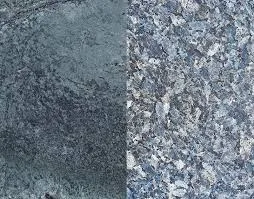Selecting the appropriate material for your countertops is an investment in the functionality, beauty, and worth of your home. It is not merely a design choice.
When deciding between soapstone and granite countertops, homeowners tend to be divided between the two. Both offer different strengths, and understanding how they differ can allow you to make an informed decision.Whether you are remodeling a kitchen or constructing a new one, this book will guide you through it all.
What Are Soapstone and Granite?
Before you can choose between soapstone and granite countertops, you need to know what each material is and what makes it special. From where they come from in nature to their texture and appearance, both have unique qualities that appeal to different tastes and lifestyles.
Soapstone
Soapstone is a natural metamorphic rock composed mainly of talc, which gives it a soft and smooth texture. Its signature look is a rich gray tone with subtle veining that darkens over time, developing a natural patina.
Key Characteristics:
- It darkens with age
- The surface is smooth, matte finish
- Non-porous and stain-resistant
- It requires regular oiling for even coloration
Granite
Granite is a natural igneous rock formed from cooled lava, known for its dense composition and stunning speckled patterns. It comes in a variety of colors and finishes, making it a favorite in modern and traditional kitchens alike.
Key Characteristics:
- Resistant to heat and scratches
- Polished or honed finish
- It is porous and requires sealing
- Wide variety of color options are available
Which One of These Holds Up Better?
Countertops endure a lot—from chopping and heat to spills and daily wear. If you want your kitchen surfaces to last, knowing how soapstone and granite perform under pressure will help guide your decision. Let’s break down which one stands the test of time.
Strengths of Soapstone
While softer than granite, soapstone is still quite durable and resistant to stains, bacteria, and chemicals. Its talc content makes it more prone to scratching, but small scratches can be buffed out or left to blend into the natural patina.
Best for: Homeowners who value a lived-in look and do not mind a little maintenance.
Granite’s Toughness
Granite is one of the hardest natural stones available, making it exceptionally scratch- and heat-resistant. However, it is porous, so regular sealing is essential to prevent staining and bacterial growth.
Best for: Busy kitchens needing a low-maintenance but robust solution.
Natural Beauty vs. Character
Your countertops play a big role in defining your kitchen’s look and feel. While functionality is key, style should not be overlooked. Soapstone and granite both have stunning visual appeal—but in very different ways. Here is how their aesthetics stack up.
The Look of Soapstone
Soapstone has a more uniform, subtle appearance that ages gracefully over time. It suits rustic, farmhouse, and industrial kitchens, especially for those who love character and evolution.
Common Colors: Deep gray, greenish-gray, and blue-gray tones.
Common Colors: White, black, gold, pink, green, and more.
Maintenance and Care: What You Need to Know
No one wants a high-maintenance kitchen. The way each countertop material holds up over time—and the effort it takes to keep them looking their best—can influence your final choice. Let’s take a closer look at the upkeep involved with both soapstone and granite.
Caring for Soapstone
- Does not require sealing
- Needs periodic mineral oil application to maintain even dark tones
- Small scratches are easy to sand or buff out
Caring for Granite
- Must be sealed regularly (every 6–12 months)
- Clean with pH-neutral cleaners
- Very little maintenance beyond sealing
Cost Comparison: Is One Less Expensive?
Price tends to be one of the largest determining factors in selecting countertops. Both soapstone and granite are premium materials, but their long-term value and cost range might differ. Let’s see how each fits in your budget.
- Soapstone: $70–$120 per square foot installed
- Granite: $50–$200/square foot installed
Whereas granite encompasses a broader price spectrum based on color and availability, soapstone is generally found in the higher-end mid-to-high range based on its specialized sourcing and low availability.
Heat and Stain Resistance: Who Wins the Practical Test?
Whether you’re putting hotpots on the counter or handling coffee spills, heat and stain resistance is key. These everyday situations can tell you a great deal about the practicality of a countertop. Here’s how soapstone and granite handle real-world kitchen conditions.
- Soapstone: Highly resistant to heat and stains. Hotpots and pans can go directly on the surface.
- Granite: Also heat-resistant but less stain-resistant unless sealed.
Best for stain resistance: Soapstone
Best for overall durability: Granite
Soapstone vs. Granite Countertops: A Quick Side-by-Side Comparison
Sometimes, the easiest way to decide is to see the facts side by side. This quick comparison chart highlights the main differences between soapstone and granite to help you spot which qualities matter most for your needs.
| Feature | Soapstone | Granite | |
| Durability | Medium (scratch-prone) | High (very hard) | |
| Maintenance | Low (needs oiling) | Medium (needs sealing) | |
| Appearance | Subtle, smooth, darkens over time | Bold, varied, polished | |
| Heat Resistance | Excellent | Excellent | |
| Stain Resistance | Excellent | Good (if sealed) | |
| Cost (installed) | $70–$120 per sq. ft. | $50–$200 per sq. ft. | |
| Environmental Impact | Lower | Higher | |
Which One Is Best for You?
With all this information in mind, it is time to weigh your priorities. Your lifestyle, design preferences, and maintenance habits will help determine whether soapstone or granite is the better fit. Let’s break it down one more time so you can choose with confidence.
- Choose soapstone if you love a soft, natural look and do not mind the occasional scratch or regular oiling.
- Choose granite if you prefer vibrant patterns, want a more traditional finish, and can commit to sealing it annually.
No matter which one you pick, both options bring value, style, and practicality to your kitchen for years to come.
Ready to Make Your Choice?
İf you are still not sure which one is best for your home, Compare samples in person and consult experts about the better fit for your kitchen routine and home aesthetic.
Seeing the samples in person and talking to a countertop expert can add clarity to your ultimate choice. Here’s a bit of encouragement to act.
Discover the distinct advantages of soapstone and granite countertops, and revolutionize your kitchen with a surface that perfectly mirrors your lifestyle.
FAQs
1. Does soapstone scratch easily?
Yes, soapstone is softer than granite and can scratch more easily. However, minor scratches can be sanded out.
2. Is granite better than soapstone for resale value?
Granite is more widely recognized and may appeal to a broader range of buyers due to its durability and appearance variety.
3. How often do I need to seal granite countertops?
It is generally recommended to seal granite once every 6 to 12 months.

